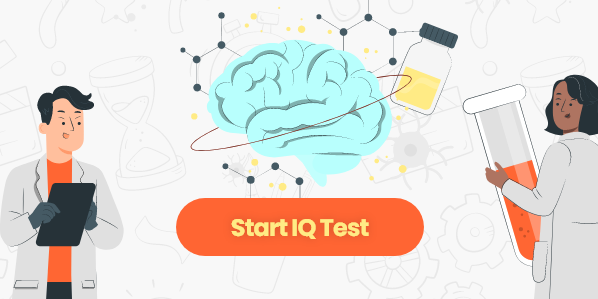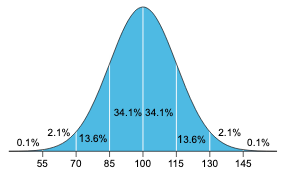Outline:
- Introduction
- Defining IQ
- The Concept of Normal IQ
- IQ Testing Methods
- Understanding IQ Scores
- Distribution of IQ Scores
- Factors Influencing IQ
- Limitations of IQ Tests
- Cultural and Environmental Factors
- IQ and Intellectual Disabilities
- IQ and Giftedness
- IQ and Success in Life
- FAQs
- Conclusion
- Get Access Now
Introduction
IQ, which stands for Intelligence Quotient, is a widely used measure of human intelligence. It provides insight into cognitive abilities, problem-solving skills, and overall intellectual capacity. In this article, we will explore the concept of a normal IQ and discuss various aspects related to IQ testing, score interpretation, and its implications. Want to know your IQ score? Click the online IQ test here and find out today!

Defining IQ
IQ is a numerical score that represents an individual's cognitive abilities compared to the general population. It is calculated based on standardized tests designed to measure intelligence. These tests assess various aspects, such as logical reasoning, verbal comprehension, spatial awareness, and processing speed.
The Concept of Normal IQ
A normal IQ refers to an IQ score that falls within a certain range (between 85 and 115) considered typical for the majority of the population. It is important to note that the concept of "normal" varies depending on the specific IQ test used. Different tests may have different scoring systems, resulting in variations in defining a normal IQ range.
IQ Testing Methods
IQ tests can be administered individually or in a group setting. Individual tests typically involve a trained professional administering the test and assessing the responses. Group tests, on the other hand, are designed to be administered to multiple individuals simultaneously, often in educational or employment settings.
Understanding IQ Scores
IQ scores are based on a standardized scale, with 100 representing the average score of the general population. The standard deviation is typically set at 15 or 16 points. Therefore, the majority of people fall within the range of 85 to 115 or 84 to 116, depending on the specific test.

Distribution of IQ Scores
IQ scores follow a normal distribution curve, also known as a bell curve. The majority of the population falls within the average range, while fewer individuals have scores that deviate significantly from the mean. Only a small percentage of the population falls into the exceptionally high or low IQ ranges.
Factors Influencing IQ
IQ is influenced by a combination of genetic and environmental factors. While genetics play a significant role in determining cognitive abilities, environmental factors, such as education, nutrition, and opportunities for intellectual stimulation, also contribute to an individual's IQ.
Limitations of IQ Tests
It is important to acknowledge the limitations of IQ tests. These tests primarily measure certain aspects of intelligence and may not capture the full range of an individual's abilities. Factors like emotional intelligence, creativity, and social skills are not directly assessed by IQ tests.
Cultural and Environmental Factors
Cultural and environmental factors can affect IQ scores. Tests developed in one culture may not accurately reflect the abilities of individuals from different cultural backgrounds. Socioeconomic factors, access to quality education, and exposure to enriched environments also play a role in IQ variations.
IQ and Intellectual Disabilities
IQ tests are often used to diagnose and classify intellectual disabilities. Individuals with IQ scores below 70 are typically considered to have intellectual disabilities. However, it is essential to consider other factors, such as adaptive functioning and social skills, when assessing intellectual disabilities.
IQ and Giftedness
High IQ scores are often associated with giftedness. Individuals with IQ scores above 130 or 140 are considered intellectually gifted. Gifted individuals may demonstrate exceptional abilities in specific domains, such as mathematics, language, or the arts.
IQ and Success in Life

While IQ can provide insights into an individual's intellectual capabilities, it is not the sole determinant of success in life. Other factors, such as motivation, perseverance, emotional intelligence, and opportunities, also contribute significantly to personal and professional achievements.
FAQs
Q: Can IQ change over time?
- A: Yes, IQ scores can change, particularly during childhood and adolescence. Factors such as education, life experiences, and cognitive stimulation can influence IQ development.
Q: Is a high IQ a guarantee of success?
- A: While a high IQ can be advantageous, success in life depends on various factors, including motivation, emotional intelligence, and opportunities for growth.
Q: Can IQ tests be culturally biased?
- A: Yes, some IQ tests may have cultural biases, as they are often developed within specific cultural contexts. Efforts are made to create culturally fair tests, but challenges remain.
Q: Are there different types of intelligence?
- A: Yes, intelligence is a multidimensional concept. Some theories propose multiple types of intelligence, such as verbal-linguistic, logical-mathematical, spatial, and interpersonal intelligence.
Q: Can IQ scores predict academic success?
- A: IQ scores provide some indication of academic potential but do not guarantee academic success. Other factors, such as motivation, study habits, and learning environment, also play crucial roles.
Conclusion
A normal IQ represents the average range of intelligence within the general population. IQ tests offer valuable insights into cognitive abilities, but they should not be considered the sole measure of a person's worth or potential. Understanding the nuances of IQ scores and considering other factors contributing to human capabilities is crucial for a comprehensive understanding of intelligence.
